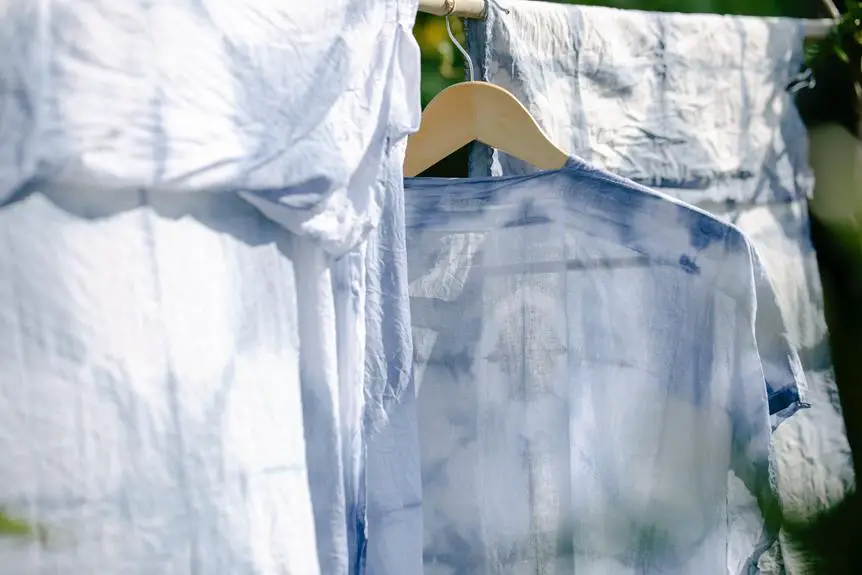Feeling like a fish out of water in the scorching heat?
Wondering if cotton is truly your knight in shining armor when it comes to battling the blazing sun?
Let's dive in and explore the age-old question: Is cotton the best fabric for hot weather?
Key Takeaways
- Cotton is highly breathable and allows air to circulate, keeping you cool in hot weather.
- Cotton's moisture absorption properties help to wick away sweat and keep you dry.
- Although cotton may not dry as quickly as synthetic fabrics, its evaporation rate contributes to its effectiveness in temperature regulation.
- Cotton's natural fibers are gentle on the skin and provide comfort for those with skin sensitivities or allergies.
The Properties of Cotton
When considering the properties of cotton, you'll find that it excels in breathability and moisture absorption, making it an ideal fabric for hot weather. Cotton's natural fibers allow for air to circulate and move freely through the fabric, keeping you cool and comfortable in warm climates. This breathability also helps to wick away sweat from your body, allowing it to evaporate quickly and leaving you feeling dry.
In addition to its breathability and moisture absorption, cotton is also known for its fabric durability. The strong and sturdy nature of cotton fibers makes it a reliable choice for clothing that can withstand regular wear and washing. This durability ensures that your cotton garments will last, even with frequent use during the hot summer months.
Understanding the properties of cotton is crucial when choosing the right fabric for hot weather. Its breathability and moisture absorption, coupled with its fabric durability, make cotton a top choice for staying cool and comfortable in the heat. Whether it's a lightweight cotton shirt or a breezy cotton dress, this fabric is designed to help you beat the heat while maintaining style and comfort.
Breathability and Moisture Wicking
To stay cool and dry in hot weather, prioritize the breathability and moisture-wicking properties of cotton. Cotton's natural fiber and fabric technology make it an excellent choice for managing moisture control and heat retention.
Here's why cotton is ideal for hot weather:
- Moisture Control: Cotton fibers have a high absorbency rate, meaning they can easily wick away sweat from your skin. This allows for quick evaporation, keeping you feeling cooler and drier.
- Breathability: The structure of cotton fabric allows for air to circulate through the material, preventing heat from being trapped against your skin. This breathability enhances comfort in hot and humid conditions.
- Heat Retention: Cotton fabric doesn't retain heat, enabling your body to regulate its temperature more effectively in hot weather. This feature makes cotton a preferred choice for staying comfortable during high temperatures.
- Evaporation Rate: Cotton's ability to absorb moisture and facilitate evaporation contributes to its effectiveness in keeping you cool and dry, making it a top choice for hot weather attire.
With its exceptional moisture-wicking capabilities and breathability, cotton is undoubtedly a top contender for hot weather clothing.
Comparing Cotton to Synthetic Fabrics
Comparing cotton to synthetic fabrics, consider their respective moisture-wicking abilities and breathability to determine the most suitable option for hot weather attire. Cotton is known for its breathability and ability to absorb moisture, making it a popular choice for hot weather. However, synthetic fabrics like polyester and nylon have been developed to compete with cotton in performance testing. Here's a fabric comparison to help you make an informed decision:
| Criteria | Cotton | Synthetic Fabrics |
|---|---|---|
| Moisture-wicking | Absorbs moisture, but dries slowly | Wicks moisture away from the skin quickly |
| Breathability | Breathable, allowing air to pass through | Generally less breathable than cotton |
| Durability | Less durable and prone to shrinking | More durable and less prone to shrinking |
| Odor Control | Retains odors and requires frequent washing | Often designed with odor control properties |
| Environmental Impact | Naturally sourced but water-intensive in production | Typically made from non-renewable resources |
Considering these factors, synthetic fabrics excel in moisture-wicking and durability, while cotton is superior in breathability and environmental impact. Ultimately, the choice between cotton and synthetic fabrics depends on your specific preferences and needs for hot weather attire.
Comfort and Skin Sensitivity
Cotton's breathability makes it an excellent choice for hot weather. It allows air to flow through the fabric, keeping your skin cool and dry. Additionally, cotton is often comfortable for people with sensitive skin. It's less likely to cause irritation or allergic reactions compared to synthetic fabrics. When it comes to hot weather and skin sensitivity, cotton is a reliable option for both comfort and maintaining healthy skin.
Cotton's Breathability Benefits Skin
When it comes to staying cool and comfortable in hot weather, cotton's breathability is unmatched, keeping your skin feeling fresh and irritation-free.
Here's why cotton's breathability benefits your skin:
- Moisture-wicking: Cotton's ability to absorb moisture from your skin allows it to evaporate, keeping you dry and comfortable.
- Air circulation: The breathable nature of cotton allows air to flow through the fabric, preventing the buildup of heat and sweat.
- Skin sensitivity: Cotton's soft and natural fibers are gentle on the skin, making it an ideal choice for those with skin sensitivities or allergies.
- Comfort: The lightweight and breathable properties of cotton ensure that your skin remains comfortable, even in the hottest of weather conditions.
With cotton, you can enjoy the benefits of breathability and comfort, all while keeping your skin feeling great.
Comfortable for Sensitive Skin
If you frequently experience skin sensitivity, cotton's natural fibers provide a comfortable and gentle option for your hot weather clothing needs. When it comes to fabric choices, sensitivity can make it challenging to find clothing that doesn't irritate your skin.
Cotton is well-known for being soft and breathable, making it an excellent choice for those with sensitive skin. Its natural properties allow for air circulation, which can help prevent irritation and discomfort. Unlike synthetic fabrics, which can trap heat and moisture, cotton can help keep your skin cool and dry.
Additionally, cotton is less likely to cause allergic reactions compared to other materials. Choosing cotton clothing for hot weather can provide the comfort and relief that sensitive skin needs, allowing you to enjoy the summer months without the added irritation.
Sustainability and Environmental Impact
When considering the environmental impact of cotton, it's essential to recognize the significant amount of water required for its production.
Additionally, the heavy use of pesticides in conventional cotton farming raises concerns about its impact on ecosystems and human health.
Furthermore, the biodegradability of cotton can be a factor to consider in assessing its sustainability.
Cotton's Water Usage
You often hear that cotton's water usage has significant sustainability and environmental impact. When it comes to the environmental impact of cotton's water usage, there are several key points to consider:
- High Water Consumption: Cotton is a water-intensive crop, requiring a substantial amount of water for irrigation, leading to potential strain on local water resources.
- Chemical Runoff: The water used for cotton cultivation often carries pesticides and fertilizers into waterways, impacting aquatic ecosystems and water quality.
- Global Water Stress: Cotton cultivation in water-stressed regions exacerbates water scarcity issues, affecting local communities and ecosystems.
- Sustainable Practices: Initiatives promoting sustainable cotton farming, such as organic and rain-fed cotton, aim to reduce water consumption and minimize environmental impact.
Understanding the implications of cotton's water usage is crucial for making informed choices about sustainable fabric options.
Pesticide Impact of Cotton
Amid the concern for sustainability and environmental impact, the pesticide usage in cotton cultivation raises critical considerations.
Pesticides are extensively used in conventional cotton farming to control pests and diseases, but this practice has significant environmental implications. The widespread use of pesticides can lead to soil and water contamination, harming ecosystems and impacting biodiversity. Additionally, pesticide exposure poses risks to farmworkers' health and nearby communities.
While some cotton producers are adopting more sustainable and eco-friendly practices, such as organic cotton farming, the overall impact of pesticide usage on the environment remains a pressing issue.
To address this challenge, it's essential for the industry to continue exploring and implementing alternative pest management strategies that reduce pesticide dependency and minimize environmental impact.
Biodegradability of Cotton
'For sustainable and environmentally friendly clothing options, consider the biodegradability of cotton in hot weather.'
When it comes to the biodegradability of cotton, there are several key benefits and environmental impact analyses to consider:
- Biodegradability Benefits: Cotton is a natural fiber that decomposes easily, reducing environmental waste and pollution. Its biodegradability makes it an eco-friendly choice for clothing.
- Reduced Environmental Impact: Unlike synthetic fabrics, cotton biodegrades without releasing harmful chemicals into the environment, minimizing the overall impact on ecosystems.
- Soil Enrichment: As cotton biodegrades, it enriches the soil, promoting healthy and fertile conditions for future plant growth.
- Sustainable Lifecycle: The biodegradability of cotton supports a sustainable lifecycle, ensuring that discarded cotton products don't contribute to long-term environmental harm.
Understanding the biodegradability benefits of cotton is essential for making informed choices about sustainable and environmentally friendly clothing options.
Maintenance and Care Tips
For optimal care of your cotton garments in hot weather, regularly wash them in cold water and avoid using bleach to maintain their quality and longevity. Follow care instructions on the garment labels and use a mild detergent to prevent any damage to the fabric.
When washing your cotton clothing, turn them inside out to preserve the color and minimize friction during the wash. It's also advisable to air dry your cotton garments instead of using a dryer, as excessive heat can cause shrinkage and weaken the fibers. If ironing is necessary, use a low to medium heat setting to prevent scorching the fabric.
Additionally, store your cotton clothing in a cool, dry place to avoid moisture and potential mildew growth. Regularly inspect your cotton garments for any stains or spots and treat them promptly to prevent them from setting in.
Considerations for Specific Activities
You should consider the specific activities you'll be engaging in to determine if cotton is the best fabric for your hot weather needs. When choosing clothing for outdoor sports, beach activities, or other hot weather pursuits, keep the following considerations in mind:
- Moisture Absorption: If you'll be engaging in outdoor sports, consider that cotton absorbs sweat and allows it to evaporate quickly, keeping you comfortable during physical activities.
- Breathability: When planning beach activities, cotton's breathability can be beneficial as it allows air to circulate around your body, helping to keep you cool and comfortable in the heat.
- Sun Protection: If your activities involve prolonged sun exposure, consider that cotton clothing provides basic sun protection, reducing the risk of sunburn.
- Comfort and Flexibility: Whether participating in outdoor sports or beach activities, cotton's soft and comfortable feel, combined with its flexibility, can make it an ideal choice for a wide range of movements and activities.
Considering these factors, cotton can be a suitable fabric choice for various hot weather activities, providing comfort, breathability, and moisture-wicking properties to keep you feeling fresh and cool.
Conclusion: Is Cotton the Ultimate Choice?
Undoubtedly, when considering the suitability of cotton for hot weather activities, it's crucial to weigh its benefits against the specific demands of your chosen pursuits.
Cotton offers breathability, moisture-wicking properties, and comfort, making it an excellent choice for a wide range of hot weather activities. Its natural fibers allow air to circulate and move freely through the fabric, keeping you cool and dry.
However, it's essential to recognize that there are fabric alternatives with their own unique benefits. For high-intensity activities or situations where quick-drying is paramount, synthetic fabrics like polyester or nylon may be more suitable due to their moisture-wicking and fast-drying capabilities.
Additionally, for activities that require protection from the sun, fabrics with built-in UV protection may be a better choice.
While cotton has its advantages, it's important to evaluate the specific needs of your activities and consider the benefits of alternative fabrics. Ultimately, the ultimate choice of fabric for hot weather depends on a careful consideration of the benefits and demands of your chosen pursuits.
Frequently Asked Questions
Can Cotton Be Used for Outdoor Activities Like Hiking or Running in Hot Weather?
When hiking in cotton, be mindful of its water retention and slow drying time, which can cause discomfort. Running in cotton may lead to chafing due to moisture accumulation. Consider moisture-wicking fabrics for outdoor activities in hot weather.
How Does Cotton Compare to Other Natural Fibers Like Linen or Bamboo in Terms of Breathability?
When comparing breathability, linen surpasses cotton due to its ability to wick moisture and provide better airflow. Bamboo also outperforms cotton in terms of breathability since it is highly absorbent and has natural ventilation properties.
What Are Some Tips for Properly Caring for and Maintaining Cotton Clothing in Hot Weather?
To properly care for and maintain cotton clothing in hot weather, remember to wash in cold water, avoid excessive heat in the dryer, and use a gentle detergent. This helps preserve fabric quality and heat resistance.
Is There a Difference in the Sustainability and Environmental Impact of Organic Cotton Versus Conventional Cotton in Hot Weather?
When it comes to organic vs conventional cotton in hot weather, consider the environmental impact. Organic cotton promotes sustainable practices, using less water and reducing chemical exposure. It's a choice that's better for the planet and your comfort.
Are There Any Specific Activities or Sports Where Cotton May Not Be the Best Choice for Hot Weather?
For hiking, synthetic fabrics work better than cotton in hot weather. They wick moisture away, keeping you dry and comfortable. When cycling, opt for moisture-wicking materials to stay cool and prevent chafing.
- Why Is Herringbone Considered a Fall and Winter Fabric? - June 19, 2025
- The Ultimate Guide to Harris Tweed Herringbone Fabric - June 19, 2025
- What Is Herringbone Twill Fabric and How Is It Used? - June 19, 2025







